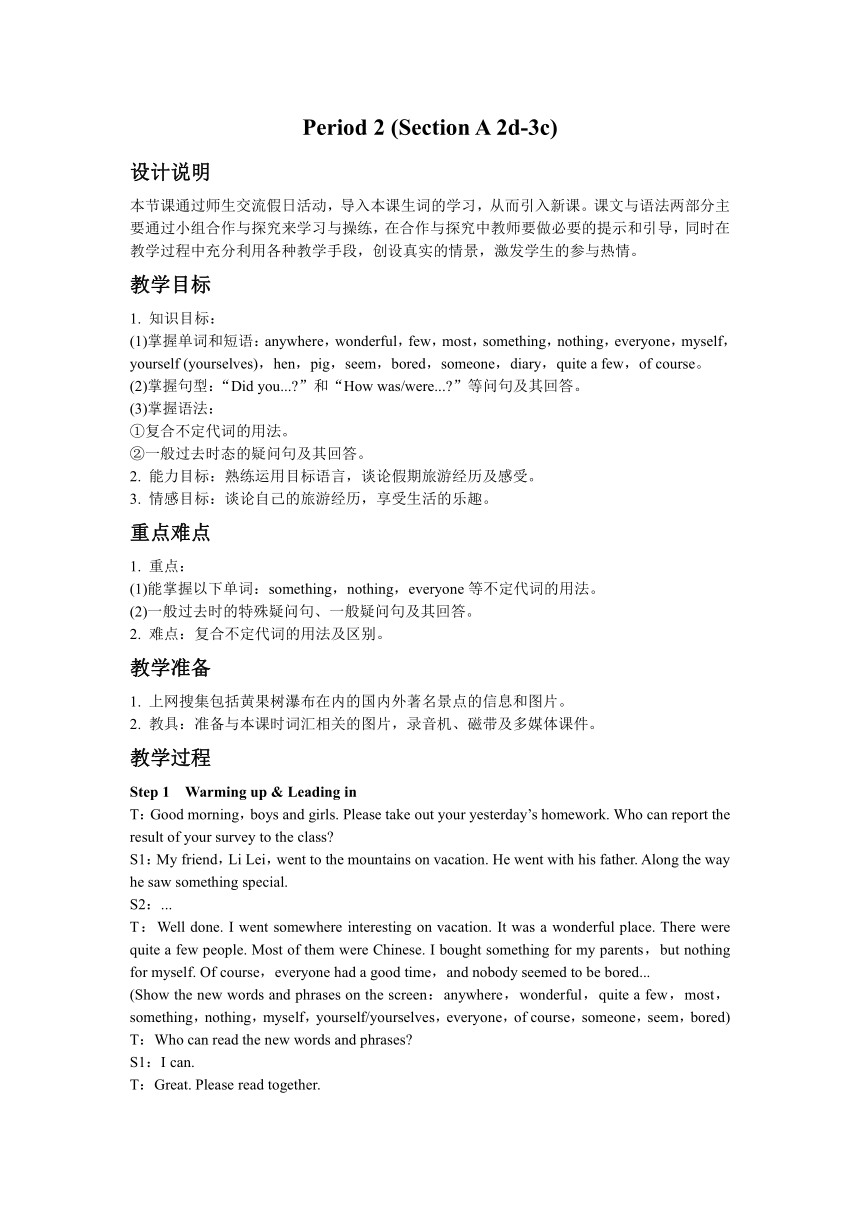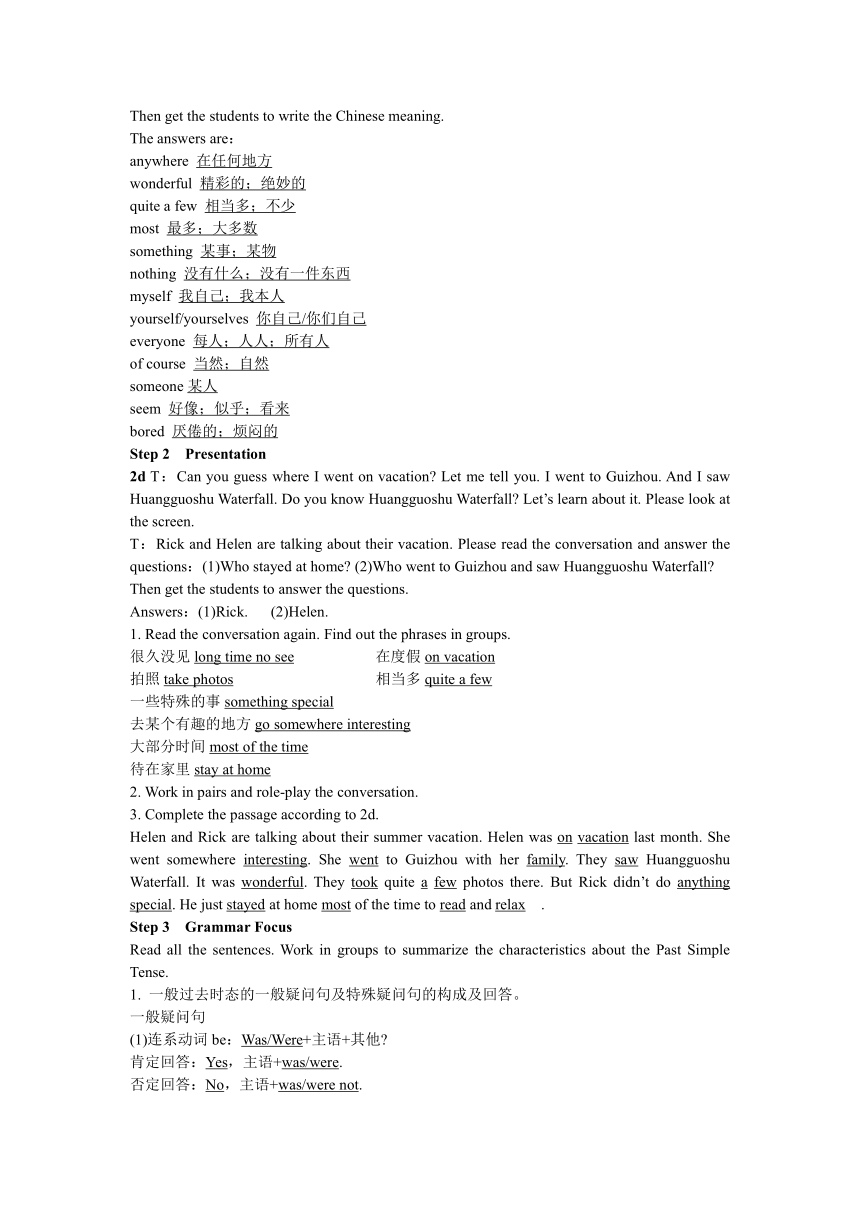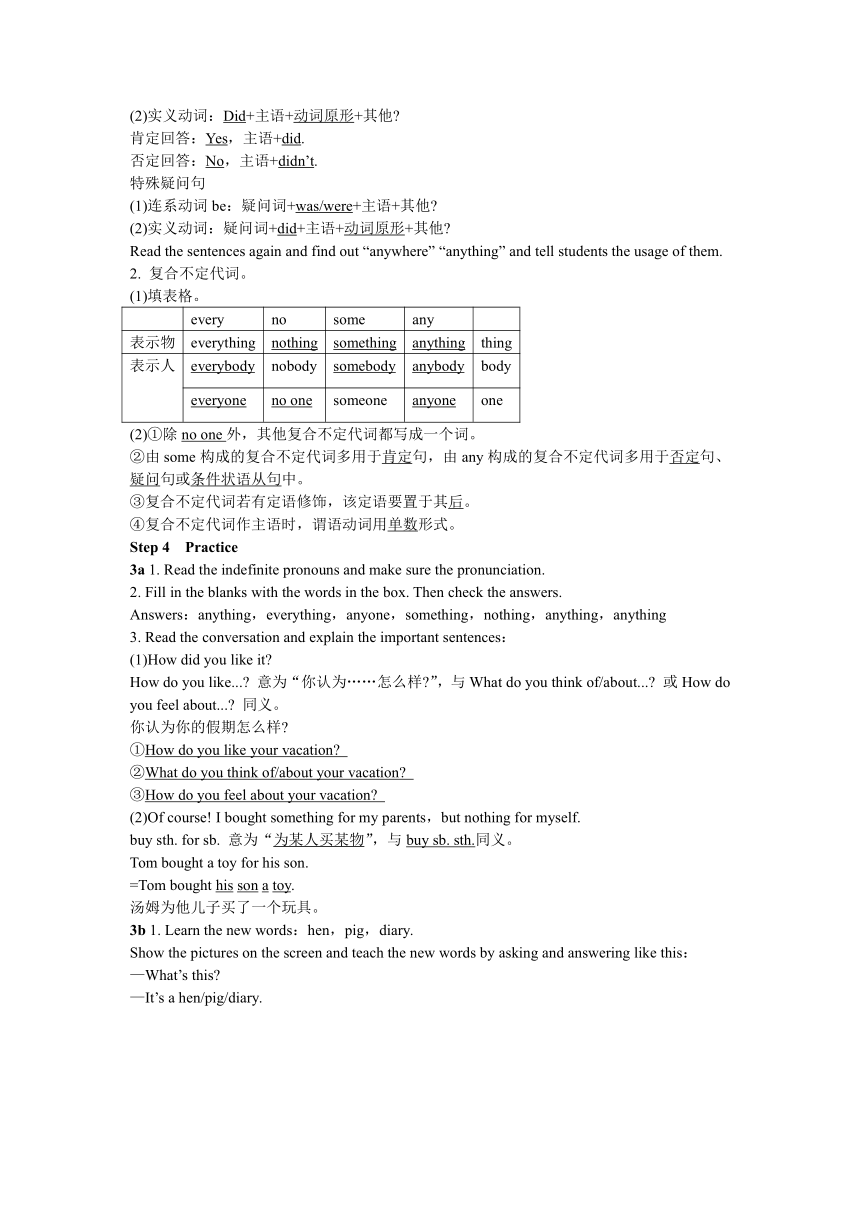人教版八年级英语上册 Unit 1 Where did you go on vacation? Section A 2d-3c 教案
文档属性
| 名称 | 人教版八年级英语上册 Unit 1 Where did you go on vacation? Section A 2d-3c 教案 |

|
|
| 格式 | docx | ||
| 文件大小 | 673.5KB | ||
| 资源类型 | 教案 | ||
| 版本资源 | 人教新目标(Go for it)版 | ||
| 科目 | 英语 | ||
| 更新时间 | 2022-07-19 12:57:12 | ||
图片预览



文档简介
Period 2 (Section A 2d-3c)
设计说明
本节课通过师生交流假日活动,导入本课生词的学习,从而引入新课。课文与语法两部分主要通过小组合作与探究来学习与操练,在合作与探究中教师要做必要的提示和引导,同时在教学过程中充分利用各种教学手段,创设真实的情景,激发学生的参与热情。
教学目标
1. 知识目标:
(1)掌握单词和短语:anywhere,wonderful,few,most,something,nothing,everyone,myself,yourself (yourselves),hen,pig,seem,bored,someone,diary,quite a few,of course。
(2)掌握句型:“Did you... ”和“How was/were... ”等问句及其回答。
(3)掌握语法:
①复合不定代词的用法。
②一般过去时态的疑问句及其回答。
2. 能力目标:熟练运用目标语言,谈论假期旅游经历及感受。
3. 情感目标:谈论自己的旅游经历,享受生活的乐趣。
重点难点
1. 重点:
(1)能掌握以下单词:something,nothing,everyone等不定代词的用法。
(2)一般过去时的特殊疑问句、一般疑问句及其回答。
2. 难点:复合不定代词的用法及区别。
教学准备
1. 上网搜集包括黄果树瀑布在内的国内外著名景点的信息和图片。
2. 教具:准备与本课时词汇相关的图片,录音机、磁带及多媒体课件。
教学过程
Step 1 Warming up & Leading in
T:Good morning,boys and girls. Please take out your yesterday’s homework. Who can report the result of your survey to the class
S1:My friend,Li Lei,went to the mountains on vacation. He went with his father. Along the way he saw something special.
S2:...
T:Well done. I went somewhere interesting on vacation. It was a wonderful place. There were quite a few people. Most of them were Chinese. I bought something for my parents,but nothing for myself. Of course,everyone had a good time,and nobody seemed to be bored...
(Show the new words and phrases on the screen:anywhere,wonderful,quite a few,most,something,nothing,myself,yourself/yourselves,everyone,of course,someone,seem,bored)
T:Who can read the new words and phrases
S1:I can.
T:Great. Please read together.
Then get the students to write the Chinese meaning.
The answers are:
anywhere 在任何地方
wonderful 精彩的;绝妙的
quite a few 相当多;不少
most 最多;大多数
something 某事;某物
nothing 没有什么;没有一件东西
myself 我自己;我本人
yourself/yourselves 你自己/你们自己
everyone 每人;人人;所有人
of course 当然;自然
someone某人
seem 好像;似乎;看来
bored 厌倦的;烦闷的
Step 2 Presentation
2d T:Can you guess where I went on vacation Let me tell you. I went to Guizhou. And I saw Huangguoshu Waterfall. Do you know Huangguoshu Waterfall Let’s learn about it. Please look at the screen.
T:Rick and Helen are talking about their vacation. Please read the conversation and answer the questions:(1)Who stayed at home (2)Who went to Guizhou and saw Huangguoshu Waterfall
Then get the students to answer the questions.
Answers:(1)Rick. (2)Helen.
1. Read the conversation again. Find out the phrases in groups.
很久没见long time no see 在度假on vacation
拍照take photos 相当多quite a few
一些特殊的事something special
去某个有趣的地方go somewhere interesting
大部分时间most of the time
待在家里stay at home
2. Work in pairs and role-play the conversation.
3. Complete the passage according to 2d.
Helen and Rick are talking about their summer vacation. Helen was on vacation last month. She went somewhere interesting. She went to Guizhou with her family. They saw Huangguoshu Waterfall. It was wonderful. They took quite a few photos there. But Rick didn’t do anything special. He just stayed at home most of the time to read and relax .
Step 3 Grammar Focus
Read all the sentences. Work in groups to summarize the characteristics about the Past Simple Tense.
1. 一般过去时态的一般疑问句及特殊疑问句的构成及回答。
一般疑问句
(1)连系动词be:Was/Were+主语+其他
肯定回答:Yes,主语+was/were.
否定回答:No,主语+was/were not.
(2)实义动词:Did+主语+动词原形+其他
肯定回答:Yes,主语+did.
否定回答:No,主语+didn’t.
特殊疑问句
(1)连系动词be:疑问词+was/were+主语+其他
(2)实义动词:疑问词+did+主语+动词原形+其他
Read the sentences again and find out “anywhere” “anything” and tell students the usage of them.
2. 复合不定代词。
(1)填表格。
every no some any
表示物 everything nothing something anything thing
表示人 everybody nobody somebody anybody body
everyone no one someone anyone one
(2)①除no one外,其他复合不定代词都写成一个词。
②由some构成的复合不定代词多用于肯定句,由any构成的复合不定代词多用于否定句、疑问句或条件状语从句中。
③复合不定代词若有定语修饰,该定语要置于其后。
④复合不定代词作主语时,谓语动词用单数形式。
Step 4 Practice
3a 1. Read the indefinite pronouns and make sure the pronunciation.
2. Fill in the blanks with the words in the box. Then check the answers.
Answers:anything,everything,anyone,something,nothing,anything,anything
3. Read the conversation and explain the important sentences:
(1)How did you like it
How do you like... 意为“你认为……怎么样 ”,与What do you think of/about... 或How do you feel about... 同义。
你认为你的假期怎么样
①How do you like your vacation
②What do you think of/about your vacation
③How do you feel about your vacation
(2)Of course! I bought something for my parents,but nothing for myself.
buy sth. for sb. 意为“为某人买某物”,与buy sb. sth.同义。
Tom bought a toy for his son.
=Tom bought his son a toy.
汤姆为他儿子买了一个玩具。
3b 1. Learn the new words:hen,pig,diary.
Show the pictures on the screen and teach the new words by asking and answering like this:
—What’s this
—It’s a hen/pig/diary.
T:Mark went to a friend’s farm in the countryside with his family. He fed some hens and saw some baby pigs. They were so cute.
2. Read Mark’s e-mail and fill in the blanks with the words in the box.
3. Check the answers.
Answers:anything,everyone,Everything,nothing,no one
4. Read the e-mail again and find out the difficult sentences. Then solve the problems and ask the students to take notes.
(1)nothing
much to do but...表示“除……外没事可做”。
Step 5 Group work
1. Work on 3c:Ask your group questions about their last vacation. Then tell the class your results.
2. Fill in the blanks according to the answers.
3. Try to make a report in each group. Then let one student read the report to the class.
(Give them enough time to work in groups. )
Step 6 Summary
T:What did we learn in this lesson Who can tell me
S1:新单词和新短语,语法:一般过去时和复合不定代词。
T:Good. The new words and phrases. Let’s look at the screen and read them together.
T:复合不定代词有哪些用法 Can you remember OK. Let’s look at the screen.
仔细观察例句中的画线部分,总结其中不定代词的用法及含义:
1. We can find something interesting on the Internet.
2. I don’t have anything important to tell you.
3. There is nothing in the room.
4. Nobody knows the secret(秘密).
当堂达标(见导学案“当堂达标”)
答案与解析:
Ⅰ. 1. yourself 当句子的宾语与主语指同一个人或物时,宾语用主语的反身代词。由答语中的I可知,you此处为单数意义,故填yourself。
2. to do nothing to do but...意为“除……外没有事情可做”,是固定用法。
3. to know seem to do sth. 是固定用法,意为“好像做某事”。
4. diaries diary为可数名词,a lot of后接可数名词复数,diary的复数形式是diaries。
5. listens 不定代词nobody作主语时,谓语动词用第三人称单数形式。本句是一般现在时态的句子,故填listens。
6. likes 7. wonderful 8. swimming 9. visited 10. pigs
Ⅱ. 1. B 问句是以did开头的一般疑问句,故也用did回答,排除C、D两项。由答语中后句句意“太糟糕了”可知此处应作否定回答,故选B。
2. D 形容词修饰不定代词时应放在不定代词之后,故排除A、B两项;anything常用于否定句、疑问句或条件状语从句中,something一般用于肯定句中,故选D。
3. B diary“日记”;hen“母鸡”;flag“旗帜”;dish“盘,碟”。根据句意“我姑姑萨莉在她的农场里养了很多母鸡”可知选B。
4. C 句意:我厌倦了他无聊的课,我不能忍受了。bored“厌倦的,烦闷的”,在句中作表语,主语一般是人;boring“无聊的,乏味的”,在句中可作表语或定语,作表语时,主语一般是事物。
5. C 根据答句“It was great! ”可知上句询问假期过得如何,故选C。
6. C
7. D 句中aunt用了单数形式,由此可知,此处名词所有格表示两人共有的,所以只在后面一个名词后加“‘s”。
8. C
Ⅲ. 1. go on vacation 2. went to the beach 3. quite a few
4. most of the time 5. keep diaries
Ⅳ. 1. How was your vacation 由答句“It was great.”及上文中提到的“I was on vacation last month.”可知,此处询问“你的假期过得怎么样 ”。
2. Where did you go 根据答句“I went to Paris.”并结合Grace说自己去度假了可知,问句表示“你去哪里了 ”。
3. Who did you go with 由答句句意“我和我最好的朋友劳拉一起去的”可知,问句表示“你和谁一起去的 ”。
4. Did you do anything interesting 由答句中的Yes可知,该问句是一个一般疑问句;又由答句中的we visited many museums和saw quite a few old things可知,问句表示“你们做什么有趣的事了吗 ”。
5. Where did you go on vacation /What about you /How about you 由答句中的“I didn’t go anywhere interesting. (我没有去任何有趣的地方)”可推知,问句表示“你假期去了哪里 ”。因为上文中已有此问句,是A问B的一个问题,B再问A同一个问题时也可用“What/How about you ”来代替此问句。
Ⅴ. 1. Where did,go 画线部分to the mountains表示地点,对地点提问用where。
2. didn’t visit
3. Who did,with 画线部分my parents是人,对人提问用who。
4. bought,for buy sb. sth. =buy sth. for sb. 意为“给某人买某物”。
5. had fun/enjoyed themselves have a good time=have fun=enjoy oneself,意为“玩得高兴,玩得愉快”。由原句中的had可知应用一般过去时,故所改写的同义句中的谓语动词也应用过去式。
Step 7 Homework
1. Read and copy the new words and phrases in this period.
2. Read and recite 2d.
3. 复习复合不定代词及反身代词的用法。
4. Write an e-mail about your vacation to your friend.
板书设计
UNIT 1 Where did you go on vacation Period 2 (Section A 2d—3c)
一般过去时 一般疑问句 ①Was/Were+主语+... Yes,主语+was/were. No,主语+wasn’t/weren’t. ②Did+主语+动词原形+... Yes,主语+did. No,主语+didn’t. 特殊疑问句 复合不定代词
教学反思
设计说明
本节课通过师生交流假日活动,导入本课生词的学习,从而引入新课。课文与语法两部分主要通过小组合作与探究来学习与操练,在合作与探究中教师要做必要的提示和引导,同时在教学过程中充分利用各种教学手段,创设真实的情景,激发学生的参与热情。
教学目标
1. 知识目标:
(1)掌握单词和短语:anywhere,wonderful,few,most,something,nothing,everyone,myself,yourself (yourselves),hen,pig,seem,bored,someone,diary,quite a few,of course。
(2)掌握句型:“Did you... ”和“How was/were... ”等问句及其回答。
(3)掌握语法:
①复合不定代词的用法。
②一般过去时态的疑问句及其回答。
2. 能力目标:熟练运用目标语言,谈论假期旅游经历及感受。
3. 情感目标:谈论自己的旅游经历,享受生活的乐趣。
重点难点
1. 重点:
(1)能掌握以下单词:something,nothing,everyone等不定代词的用法。
(2)一般过去时的特殊疑问句、一般疑问句及其回答。
2. 难点:复合不定代词的用法及区别。
教学准备
1. 上网搜集包括黄果树瀑布在内的国内外著名景点的信息和图片。
2. 教具:准备与本课时词汇相关的图片,录音机、磁带及多媒体课件。
教学过程
Step 1 Warming up & Leading in
T:Good morning,boys and girls. Please take out your yesterday’s homework. Who can report the result of your survey to the class
S1:My friend,Li Lei,went to the mountains on vacation. He went with his father. Along the way he saw something special.
S2:...
T:Well done. I went somewhere interesting on vacation. It was a wonderful place. There were quite a few people. Most of them were Chinese. I bought something for my parents,but nothing for myself. Of course,everyone had a good time,and nobody seemed to be bored...
(Show the new words and phrases on the screen:anywhere,wonderful,quite a few,most,something,nothing,myself,yourself/yourselves,everyone,of course,someone,seem,bored)
T:Who can read the new words and phrases
S1:I can.
T:Great. Please read together.
Then get the students to write the Chinese meaning.
The answers are:
anywhere 在任何地方
wonderful 精彩的;绝妙的
quite a few 相当多;不少
most 最多;大多数
something 某事;某物
nothing 没有什么;没有一件东西
myself 我自己;我本人
yourself/yourselves 你自己/你们自己
everyone 每人;人人;所有人
of course 当然;自然
someone某人
seem 好像;似乎;看来
bored 厌倦的;烦闷的
Step 2 Presentation
2d T:Can you guess where I went on vacation Let me tell you. I went to Guizhou. And I saw Huangguoshu Waterfall. Do you know Huangguoshu Waterfall Let’s learn about it. Please look at the screen.
T:Rick and Helen are talking about their vacation. Please read the conversation and answer the questions:(1)Who stayed at home (2)Who went to Guizhou and saw Huangguoshu Waterfall
Then get the students to answer the questions.
Answers:(1)Rick. (2)Helen.
1. Read the conversation again. Find out the phrases in groups.
很久没见long time no see 在度假on vacation
拍照take photos 相当多quite a few
一些特殊的事something special
去某个有趣的地方go somewhere interesting
大部分时间most of the time
待在家里stay at home
2. Work in pairs and role-play the conversation.
3. Complete the passage according to 2d.
Helen and Rick are talking about their summer vacation. Helen was on vacation last month. She went somewhere interesting. She went to Guizhou with her family. They saw Huangguoshu Waterfall. It was wonderful. They took quite a few photos there. But Rick didn’t do anything special. He just stayed at home most of the time to read and relax .
Step 3 Grammar Focus
Read all the sentences. Work in groups to summarize the characteristics about the Past Simple Tense.
1. 一般过去时态的一般疑问句及特殊疑问句的构成及回答。
一般疑问句
(1)连系动词be:Was/Were+主语+其他
肯定回答:Yes,主语+was/were.
否定回答:No,主语+was/were not.
(2)实义动词:Did+主语+动词原形+其他
肯定回答:Yes,主语+did.
否定回答:No,主语+didn’t.
特殊疑问句
(1)连系动词be:疑问词+was/were+主语+其他
(2)实义动词:疑问词+did+主语+动词原形+其他
Read the sentences again and find out “anywhere” “anything” and tell students the usage of them.
2. 复合不定代词。
(1)填表格。
every no some any
表示物 everything nothing something anything thing
表示人 everybody nobody somebody anybody body
everyone no one someone anyone one
(2)①除no one外,其他复合不定代词都写成一个词。
②由some构成的复合不定代词多用于肯定句,由any构成的复合不定代词多用于否定句、疑问句或条件状语从句中。
③复合不定代词若有定语修饰,该定语要置于其后。
④复合不定代词作主语时,谓语动词用单数形式。
Step 4 Practice
3a 1. Read the indefinite pronouns and make sure the pronunciation.
2. Fill in the blanks with the words in the box. Then check the answers.
Answers:anything,everything,anyone,something,nothing,anything,anything
3. Read the conversation and explain the important sentences:
(1)How did you like it
How do you like... 意为“你认为……怎么样 ”,与What do you think of/about... 或How do you feel about... 同义。
你认为你的假期怎么样
①How do you like your vacation
②What do you think of/about your vacation
③How do you feel about your vacation
(2)Of course! I bought something for my parents,but nothing for myself.
buy sth. for sb. 意为“为某人买某物”,与buy sb. sth.同义。
Tom bought a toy for his son.
=Tom bought his son a toy.
汤姆为他儿子买了一个玩具。
3b 1. Learn the new words:hen,pig,diary.
Show the pictures on the screen and teach the new words by asking and answering like this:
—What’s this
—It’s a hen/pig/diary.
T:Mark went to a friend’s farm in the countryside with his family. He fed some hens and saw some baby pigs. They were so cute.
2. Read Mark’s e-mail and fill in the blanks with the words in the box.
3. Check the answers.
Answers:anything,everyone,Everything,nothing,no one
4. Read the e-mail again and find out the difficult sentences. Then solve the problems and ask the students to take notes.
(1)nothing
much to do but...表示“除……外没事可做”。
Step 5 Group work
1. Work on 3c:Ask your group questions about their last vacation. Then tell the class your results.
2. Fill in the blanks according to the answers.
3. Try to make a report in each group. Then let one student read the report to the class.
(Give them enough time to work in groups. )
Step 6 Summary
T:What did we learn in this lesson Who can tell me
S1:新单词和新短语,语法:一般过去时和复合不定代词。
T:Good. The new words and phrases. Let’s look at the screen and read them together.
T:复合不定代词有哪些用法 Can you remember OK. Let’s look at the screen.
仔细观察例句中的画线部分,总结其中不定代词的用法及含义:
1. We can find something interesting on the Internet.
2. I don’t have anything important to tell you.
3. There is nothing in the room.
4. Nobody knows the secret(秘密).
当堂达标(见导学案“当堂达标”)
答案与解析:
Ⅰ. 1. yourself 当句子的宾语与主语指同一个人或物时,宾语用主语的反身代词。由答语中的I可知,you此处为单数意义,故填yourself。
2. to do nothing to do but...意为“除……外没有事情可做”,是固定用法。
3. to know seem to do sth. 是固定用法,意为“好像做某事”。
4. diaries diary为可数名词,a lot of后接可数名词复数,diary的复数形式是diaries。
5. listens 不定代词nobody作主语时,谓语动词用第三人称单数形式。本句是一般现在时态的句子,故填listens。
6. likes 7. wonderful 8. swimming 9. visited 10. pigs
Ⅱ. 1. B 问句是以did开头的一般疑问句,故也用did回答,排除C、D两项。由答语中后句句意“太糟糕了”可知此处应作否定回答,故选B。
2. D 形容词修饰不定代词时应放在不定代词之后,故排除A、B两项;anything常用于否定句、疑问句或条件状语从句中,something一般用于肯定句中,故选D。
3. B diary“日记”;hen“母鸡”;flag“旗帜”;dish“盘,碟”。根据句意“我姑姑萨莉在她的农场里养了很多母鸡”可知选B。
4. C 句意:我厌倦了他无聊的课,我不能忍受了。bored“厌倦的,烦闷的”,在句中作表语,主语一般是人;boring“无聊的,乏味的”,在句中可作表语或定语,作表语时,主语一般是事物。
5. C 根据答句“It was great! ”可知上句询问假期过得如何,故选C。
6. C
7. D 句中aunt用了单数形式,由此可知,此处名词所有格表示两人共有的,所以只在后面一个名词后加“‘s”。
8. C
Ⅲ. 1. go on vacation 2. went to the beach 3. quite a few
4. most of the time 5. keep diaries
Ⅳ. 1. How was your vacation 由答句“It was great.”及上文中提到的“I was on vacation last month.”可知,此处询问“你的假期过得怎么样 ”。
2. Where did you go 根据答句“I went to Paris.”并结合Grace说自己去度假了可知,问句表示“你去哪里了 ”。
3. Who did you go with 由答句句意“我和我最好的朋友劳拉一起去的”可知,问句表示“你和谁一起去的 ”。
4. Did you do anything interesting 由答句中的Yes可知,该问句是一个一般疑问句;又由答句中的we visited many museums和saw quite a few old things可知,问句表示“你们做什么有趣的事了吗 ”。
5. Where did you go on vacation /What about you /How about you 由答句中的“I didn’t go anywhere interesting. (我没有去任何有趣的地方)”可推知,问句表示“你假期去了哪里 ”。因为上文中已有此问句,是A问B的一个问题,B再问A同一个问题时也可用“What/How about you ”来代替此问句。
Ⅴ. 1. Where did,go 画线部分to the mountains表示地点,对地点提问用where。
2. didn’t visit
3. Who did,with 画线部分my parents是人,对人提问用who。
4. bought,for buy sb. sth. =buy sth. for sb. 意为“给某人买某物”。
5. had fun/enjoyed themselves have a good time=have fun=enjoy oneself,意为“玩得高兴,玩得愉快”。由原句中的had可知应用一般过去时,故所改写的同义句中的谓语动词也应用过去式。
Step 7 Homework
1. Read and copy the new words and phrases in this period.
2. Read and recite 2d.
3. 复习复合不定代词及反身代词的用法。
4. Write an e-mail about your vacation to your friend.
板书设计
UNIT 1 Where did you go on vacation Period 2 (Section A 2d—3c)
一般过去时 一般疑问句 ①Was/Were+主语+... Yes,主语+was/were. No,主语+wasn’t/weren’t. ②Did+主语+动词原形+... Yes,主语+did. No,主语+didn’t. 特殊疑问句 复合不定代词
教学反思
同课章节目录
- Unit 1 Where did you go on vacation?
- Section A
- Section B
- Unit 2 How often do you exercise?
- Section A
- Section B
- Unit 3 I'm more outgoing than my sister.
- Section A
- Section B
- Unit 4 What's the best movie theater?
- Section A
- Section B
- Unit 5 Do you want to watch a game show?
- Section A
- Section B
- Unit 6 I'm going to study computer science.
- Section A
- Section B
- Unit 7 Will people have robots?
- Section A
- Section B
- Unit 8 How do you make a banana milk shake?
- Section A
- Section B
- Unit 9 Can you come to my party?
- Section A
- Section B
- Unit 10 If you go to the party, you'll have a grea
- Section A
- Section B
